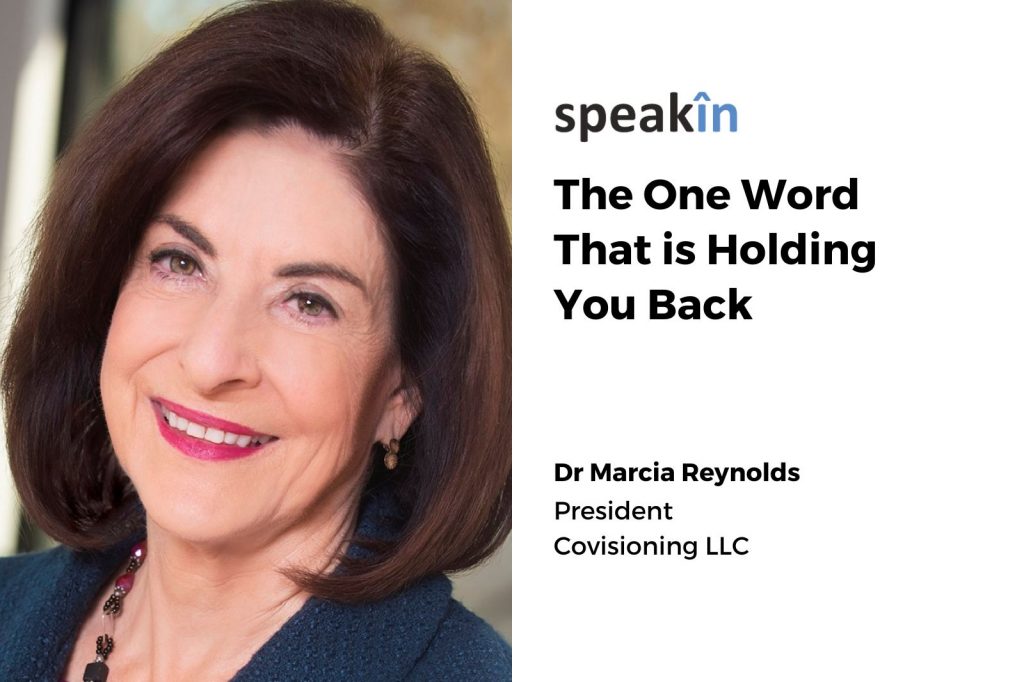The One Word That is Holding You Back

My clients are often clear about what they want to create or change in a situation they don’t like now. Then they speak the dreaded word:
But…
I did a coaching demo the other day where she was interjecting but into every sentence until I called her on this habit. “Did you know that every time you tell me what you want or what you know you need to do, you follow up the statement with the word but.” She looked away embarrassed and then turned back to me, her mouth about to form the word again. Then she smiled, laughed, and asked, “AND, what can I do differently?”
I said, “Sounds like you just found another word to use!”
The next few interactions were choppy as she had to backtrack a few times to avoid saying the word or to interject the word, “and.” She smiled every time she reformed her thoughts. Working with her awareness around the limiting word, “but” and her willingness to stay in the conversation, we discovered what she was afraid of, what small step she could take today that wasn’t a huge risk, and how this perspective could help her become more confident on the way to making her dream come true.
The meaning behind the word BUT
The word but signals that a person’s brain has quickly conjured up reasons for not taking a risk, for not doing something that will feel awkward, or for not making a mistake that feels like failure. What follows the but is your fear or your limiting belief. The primary purpose of the brain is to keep you safe and alive. Whether you are asleep or awake, your brain is always on the lookout for harm.
The result: You do not give the same weight to the potentially positive results of an action as you do to threats and negative scenarios. Your thoughts about the future are filtered through this lens of protection. And then your brain masterfully lists all the bad things that could happen and highlights the worst-case scenarios.
I recently had a client who couldn’t seem to find the right time to ask her boss to broaden her responsibilities. There was always a good excuse for not making the request. I asked, “What is the worst thing that could happen if you ask for what you want?” She said she was afraid her boss might see her as wanting his job. I asked, “What happens if he does?” First, she admitted that he probably wouldn’t respond that way and even if he did, she said she could find a way to spin her request so it wasn’t a threat.
Finally I asked, “What are you most afraid of losing?” and she spilled out, “Credibility, my current job, distance from my boss if I make him feel guilty…and then what if I am not up to taking on more?”
Once all her excuses were on the table, we could look at the reality of each one. How likely was the negative outcome? What would she do if it came to pass? In the end, my client found no good reason for not making her request.
Most of time, the fears that keep you from moving forward are fears of losing respect, credibility, position, significance, positive regard, and love. You seek to avoid feeling humiliated and embarrassed, looking stupid, being wrong and being rejected.
The outcome: You spend more time defending inaction instead of planning actions to take.
The word but allows you to take fewer risks, delay making vital changes, avoid intimacy, resist suggestions, rationalize the status quo, numb your brain with chemicals or mindless entertainment, and decrease your capacity to see opportunities and different points of view.
Acknowledge your fear in order to hear
Before you can see and hear new possibilities, you must acknowledge the fears that might exist. Be honest. Be thorough. Look for the little fears you tend not to notice but that direct your choices. Name them even if they are clearly illogical. Because your brain loves to protect you, small but controlling fears are sparked in our minds all the time. The reactions have nothing to do with logic.
Ask yourself…
- Am I open to trying something new or speaking my mind about this issue?
- If not, what feelings are stopping me: fear, guilt, embarrassment, or anger?
- What am I afraid of losing, really (link to social needs that trigger emotions) —being right, feeling significant, or being liked? Or, what do I think is being taken from me—respect, love, attention, dignity?
- Am I willing to focus on self-acceptance and my own worth and value over the fear of losing face? If so, what will it take for me to shift to this stronger state of mind?
- What would I do if I had nothing personally to worry about? What if no buts existed?
- What decision would I make if I were brave?
Self-awareness is the first step to outsmarting your over-protective brain. Know what your brain is doing. Question your first choices to see if there are other things you can choose instead. Then choose to act in your highest good.
Immerse in more interesting and engaging reads at: https://covisioning.com/brain-tips-blog/
About The Writer
Dr. Marcia Reynolds has coached leaders, delivered leadership and emotional intelligence programs, and spoken at conferences for clients in 43 countries. She has also presented at many universities including Harvard Kennedy School and Cornell University.
Marcia is a pioneer in the coaching profession. She was the 5th global president of the International Coach Federation and is one of 20 coaches recognized in the ICF Circle of Distinction. Currently, she is the training director for the Healthcare Coaching Institute in the US and on faculty of 5 coaching schools in Asia and Europe.





